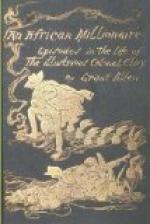He could do anything, it really seemed, from shoeing a mule to conducting a camp-meeting; he was a capital chemist, a very sound surgeon, a fair judge of horseflesh, a first class euchre player, and a pleasing baritone. When occasion demanded he could occupy a pulpit. He had invented a cork-screw which brought him in a small revenue; and he was now engaged in the translation of a Polish work on the “Application of Hydrocyanic Acid to the Cure of Leprosy.”
Still, we reached New York without having got any nearer our goal, as regarded Dr. Quackenboss. He came to bid us good-bye at the quay, with that sphinx-like smile still playing upon his features. Charles clutched the dispatch-box with one hand, and Mrs. Quackenboss’s little palm with the other.
“Don’t tell us,” he said, “this is good-bye—for ever!” And his voice quite faltered.
“I guess so, Mr. Porter,” the pretty American replied, with a telling glance. “What hotel do you patronise?”
“The Murray Hill,” Charles responded.
“Oh my, ain’t that odd?” Mrs. Quackenboss echoed. “The Murray Hill! Why, that’s just where we’re going too, Elihu!”
The upshot of which was that Charles persuaded them, before returning to Kentucky, to diverge for a few days with us to Lake George and Lake Champlain, where he hoped to over-persuade the recalcitrant doctor.
To Lake George therefore we went, and stopped at the excellent hotel at the terminus of the railway. We spent a good deal of our time on the light little steamers that ply between that point and the road to Ticonderoga. Somehow, the mountains mirrored in the deep green water reminded me of Lucerne; and Lucerne reminded me of the little curate. For the first time since we left England a vague terror seized me. Could Elihu Quackenboss be Colonel Clay again, still dogging our steps through the opposite continent?
I could not help mentioning my suspicion to Charles—who, strange to say, pooh-poohed it. He had been paying great court to Mrs. Quackenboss that day, and was absurdly elated because the little American had rapped his knuckles with her fan and called him “a real silly.”
Next day, however, an odd thing occurred. We strolled out together, all four of us, along the banks of the lake, among woods just carpeted with strange, triangular flowers—trilliums, Mrs. Quackenboss called them—and lined with delicate ferns in the first green of springtide.
I began to grow poetical. (I wrote verses in my youth before I went to South Africa.) We threw ourselves on the grass, near a small mountain stream that descended among moss-clad boulders from the steep woods above us. The Kentuckian flung himself at full length on the sward, just in front of Charles. He had a strange head of hair, very thick and shaggy. I don’t know why, but, of a sudden, it reminded me of the Mexican Seer, whom we had learned to remember as Colonel Clay’s first embodiment. At the same moment the same thought seemed to run through Charles’s head; for, strange to say, with a quick impulse he leant forward and examined it. I saw Mrs. Quackenboss draw back in wonder. The hair looked too thick and close for nature. It ended abruptly, I now remembered, with a sharp line on the forehead. Could this, too, be a wig? It seemed very probable.




